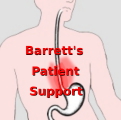Heartburn
Heartburn is a distinctive burning feeling in the chest caused by stomach acid rising up into the gullet or oesophagus. It often occurs at night when people are lying down. It is also referred to as acid reflux, and can be quite painful. It is common - on some estimates as many as 40% of people will suffer from an episode of acid reflux at some point in any one week.
There is a valve (the lower oesophageal sphincter) at the top of the stomach, connected with the muscles of the diaphragm, which is meant to keep acid within the stomach. Acid in the stomach is necessary for a good digestion and for other reasons. The body cells lining the stomach can cope with the acid, but the cells in the oesophagus are different, and get irritated.
The valve may not work as it should for a number of reasons:
- Women often suffer from heartburn on a temporary basis when they are pregnant because of the size of their abdomen
- Obesity puts a strain on the system and can act to push the stomach contents up into the oesophagus
- A hiatus hernia involves part of the stomach rising up higher than the valve
- Smoking can relax the valve
- Lying down, especially at night, means that gravity will no longer help to keep the stomach contents in their right place
- Intrinsic loss of function of the valve may occur without a specific cause being known
There are plenty of over-the-counter indigestion remedies that will help heartburn, and doctors can prescribe medication to reduce stomach acid.
Persistent Heartburn
If heartburn is persistent we should start to think about whether there are any underlying causes, because persistent heartburn is not normal.
By 'persistent' we mean that we are suffering heartburn on a daily basis for three weeks or more. You may be dealing with it by taking an indigestion remedy from the chemist, but at this point it is probably not just a temporary stomach upset or bug. So it is worth checking with your doctor.
If you have been suffering persistent heartburn for a long time, several months or more, you should definitely consult your doctor to investigate any underlying causes. It is important to go straight away if you are also suffering from difficulty in swallowing, or food 'sticking' in your oesophagus.
The stomach acid and other contents can, over time, damage the cells lining your oesophagus. The damage occurs in two phases. The first is simple inflammation of the normal oesophageal cells (oesophagitis) that occurs with 70% of those who have reflux disease. The second phase is rarer, occurring in about 10%, and is a condition called Barrett's Oesophagus where columns of cells start to change colour; it is a change in character of the cells of the oesophageal lining so that they resemble those of the stomach or intestine (metaplasia). There are estimated to be more than 400,000 people in the United Kingdom who suffer from Barrett's Oesophagus, but in many cases it has not been diagnosed.
Barrett's Oesophagus can sometimes be successfully treated by a technique known as radio frequency ablation that removes the affected cells.
Barrett's Oesophagus is defined as a change to the cells of the oesophagus so that they resemble the cells of the stomach or intestine. This change of cells causes a loss of symptoms of oesophagitis when the inflamed, hypersensitive lining is replaced by somach-like or intestinal-like cells, which are both insensitive to acid. This can take some years. So if you are approaching middle age and used to suffer lot from heartburn which has now stopped, it is still important to see your doctor to investigate whether you do have Barrett's Oesophagus.
Water Brash
Water brash - a sour taste in the mouth, often at night - may also be an indication that stomach contents are rising up into the oesophagus. Sometimes people may also taste bile, which is a strong alkali and very bitter. If this is persistent, the same principle applies as for heartburn - consult your GP about underlying causes.
Anti Reflux Procedures
Sometimes surgical procedures become relevant when patients do not repond to medication, or have a serious hiatus hernia. This is an issue where experienced specialist medical advice becomes necessary. In some cases, the Linx device, a magnetic bracelet, can recreate the valve-like effect of the lower oesophageal sphincter.
NICE Quality Standards on Management of Dyspepsia and GORD (published July 2015)
Action Against Heartburn supports a new section of the NICE QS96 Quality Standard for the Investigation and Management of Dyspepsia and Gastro Oesophageal Reflux Disease (GORD) which states:
Statement 5: Adults with persistent, unexplained dyspepsia or reflux symptoms have a discussion with their GP about referral to a specialist service.
Down With Acid!
Down With Acid! is a book about reflux written by Chris Robinson, former Chairman of Barrett's Wessex that aims to explain about acid reflux in everyday terms. It has medical references but is written for patients interested in learning more.





















